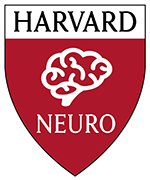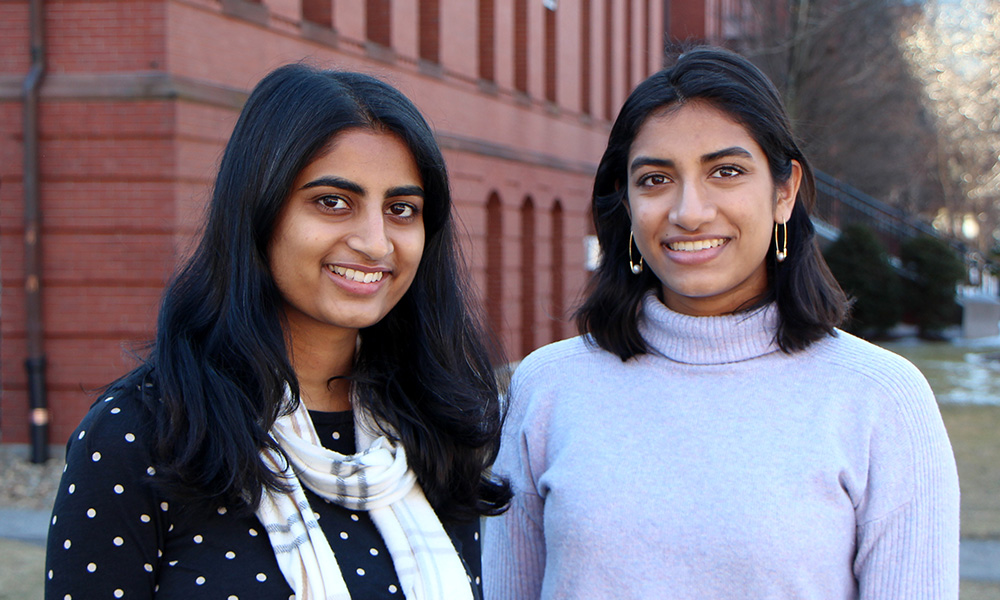Nidhi Patel (Government and Neuro ‘22) and Marissa Sumathipala (Neuro with Secondary in Chemistry ‘22) have been awarded prestigious Gates Cambridge Scholarships that will support their postgraduate studies and research at University of Cambridge, UK. Sumathipala also received a Churchill Scholarship that will enable her to read for an M.Phil in Clinical Neurosciences at Cambridge’s Churchill College before continuing on to her Ph.D. studies the following year.

At Cambridge, Patel will build on her undergraduate thesis research on the political and neurobiological effects of witnessing violence. Specifically, she is using the data from the Adolescent Brain Cognitive Development study to examine the potential neural mechanisms driving the relationship between early exposure to violence and prosocial behavior in youth. Her long-term goal is to design and implement education and health policies that can empower communities affected by violence.
“I am enthusiastic about the prospect of working at the Centre of Governance and Human Rights and Centre for Gender Studies, cutting-edge research networks that bring together a diverse amalgamation of professors, students, and professionals for projects and enriching seminars on topics related to the politics of psychosocial welfare, peacebuilding, gender, and health in conflict-affected societies. I am so incredibly honored to join the wider Gates Cambridge community, and am looking forward to growing alongside my peers during my time in the UK!” Patel plans to eventually pursue a Ph.D. or go to law school after earning her M. Phil.
“Nidhi is the true embodiment of an interdisciplinary scholar,” says Associate Concentration Advisor in Neuroscience Laura Magnotti. “She is bursting with creative ideas to combine her interests in Neuroscience and Government and also has the drive and determination to turn those ideas into reality. For example, most thesis writers choose a lab first, become familiar with the research goals and methods of that lab, and then develop a thesis project under the lab’s guidance. Nidhi, however, first chose a topic she was passionate about, formulated an interesting question to pursue, identified an appropriate dataset (all on her own), and then convinced a lab to support her efforts.”
Reflecting on her time at Harvard, Patel expressed a great deal of gratitude. “Being an undergraduate at Harvard has undoubtedly been a magical and life-changing experience,” she says. “I feel so lucky to have gotten the chance to grow alongside people from all corners of the world, and to take classes in a wide range of disciplines with brilliant scholars and community leaders. I’m extremely thankful for the countless professors, mentors, teaching fellows, Eliot House community members, and friends who have consistently encouraged and supported me throughout my four years here, and for all the educators who touched my life even before I came to college.”

Sumathipala will pursue both a Master’s and a Ph.D. in Clinical Neurosciences, with the goal of someday establishing her own lab that will conduct translational neuroscience aimed at developing treatments for conditions such as schizophrenia and dementia.
“My passion for neuroscience came from my first love, figure skating,” she says. “Growing up, I’d always dreamed of being a professional figure skater. I suffered a severe concussion my sophomore year of high school. Through years of recovery, I found medicine had few treatments for brain injuries.”
Frustrated by the lack of treatment options for people struggling with memory loss and other cognitive issues, Sumathipala joined a neuroscience lab at Janelia Research Institute while still in high school. Since then, she has worked with five different labs, applying both experimental and computational techniques to neurological disease pathways. She is currently conducting her senior thesis research in the McCarroll Lab at HMS, where she is studying which RNAs turn up at synapses in the human brain.
“Marissa has been one of our most serious researchers throughout her time at Harvard,” says Magnotti, who advises Sumathipala. “In fact, she might be the only student I’ve ever met who managed to join a lab before even setting foot on campus as a freshman, which is a testament to her impressive level of scientific maturity…Throughout her 4 years in the McCarroll lab, her initiative, intellect, and mastery of techniques have made her a scientific star.
Next year, at University of Cambridge, she will join Andros Lakatos’ lab, which is a leading hub for research on organoids, which are three-dimensional lab-grown models of organs and tissues. Sumathipala will learn how to grow brain organoids from patient-derived cells and investigate the molecular basis of ALS (amyotrophic lateral sclerosis) and dementia. “Devastating neurological diseases like ALS and dementia don’t have effective treatments, so it is my hope that my research will pave the way for new therapeutics,” she says. “Brain organoids have so much potential to transform our understanding of neurological disease, and finally make progress for those afflicted.”
Sumathipala is looking forward to the next phase of her career and expressed gratitude to Harvard’s neuroscience and biomedical community. “The conversations I had with others about research, whether pondering the neuroscience of intelligence tests or commiserating over failed experiments, made me feel I was part of a community at Harvard and has shaped my passion to pursue a career in research,” she says. “As I look towards graduation, I am filled with excitement to start this next stage of my career in the UK, but also sadness to leave the incredible people I’ve met and the cherished memories of my time at Harvard.”
She would particularly like to thank her research mentors: Steven McCarroll of HMS, Marta Florio of HMS, and Gwyneth Card of Janelia Research Institute, as well as Leverett House tutor Judith Murciano.
Congratulations to these scholar-elects!



